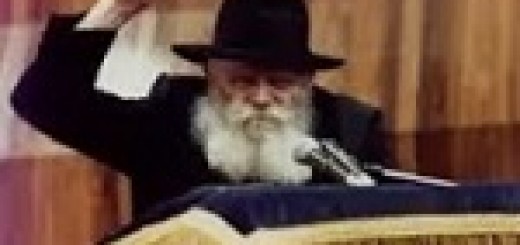By Rabbi Akiva Wagner
The following story I once read in the sefer “Likuttei Sipurim” of Rabbi Mottel Perlow. However, some time has passed since then, and my sefer has since disappeared, so I am writing it as best as I can from memory, and I will welcome any corrections:
The group of Chassidim were travelling, and they stopped off at an inn (as Chassidim were wont to do, to provide for so many chassidishe maasiyos). They noted that the proprietress appeared to be a woman in a very advanced age. She, in turn, noticed them, and called them to her. “I see that you are Chassidim”, she said to them, “let me tell you my story”:
‘When I was a young woman’ she began, ‘my husband disappeared without a trace, leaving me alone with our baby. Someone directed me to the holy Baal Shem Tov, and I went to him, brokenhearted and grasping my baby in my arms, and begged for his brocho and advice.
‘The Baal Shem Tov looked at me with great compassion, and said to me as follows: “My daughter, I have searched, and I don’t see your husband, neither in this world, nor in the world to come, and I am afraid, therefore, that you are destined to a hard life of loneliness”.
“However”, he continued, “if you promise me that you will remain faithful to the Torah and continue to live as a good Jewish daughter, then I promise you a long life, much wealth, and you will see many descendents from this child in your arms”.
“Boruch Hashem”, the woman concluded, “the Tzaddik’s brochos were realized in their entirety. I have reached a ripe old age, I have attained great wealth, and that (man/woman?) is the child that I had with me at the time, and from whom I have seen by now many children, grandchildren and great grandchildren”.
Rabbi Perlow, after recounting the above story, raises the obvious question: How can someone be neither in this world nor in the next? Must not everyone be found at least in some world? How is it possible that the Baal Shem Tov said that her husband couldn’t be located in either world?
Perhaps one way of understanding this could be based on a statement of the Alter Rebbe. The Alter Rebbe once remarked: “Ich hob shoin gemacht mein Chassidim far kalyikes. Kein hano’oh fun olam hazeh vellen zei shoyn nisht kennen hoben”. [I already spoiled my Chassidim; – they will not be able to enjoy olam hazeh].
Indeed, a chosid has the option to learn and daven. He can dedicate himself to serving the Eibishter, and renounce worldly pleasures. He has the ability and opportunity to choose the pursuit of G-dliness over the pursuit of worldliness. He can fulfill the directive of the Rambam, to be as shevet Levi, and choose spirituality over mundane-ness.
But, he may also decide that he doesn’t want to give up on worldly indulgences, that he can’t forego material pleasures. He may try his hand at deriving benefit from theshmorei ho’oifanim, that abound in the world around him.
Well, in that case, he may just find that he is a kireach mikan umikan. The world that is available to him he didn’t take advantage of, while the world that he pursues is not really open to him. That will not really be his world, no matter how hard he tries.
Thus he may just find himself in no world.
[R’ Yochanan Gordon was the gabay in Lubavitch, in 770. He was a very wise man, in addition to being a great chosid who was mekushar to the Rebbe.
Once, during a farbrengen, he felt ill, and had to be carried out by hatzolloh. After some time passed, however, he felt better, and decided that, as the farbrengen was still in progress, he might as well return to the farbrengen. When he entered, the Rebbe looked at him in surprise. In response to the Rebbe’s questioning glance, he explained: “Ich bin ongekummen dorten, ber di gehinom iz doch farmacht oif Shabbos, un in gan eden hot men mir nit gevolt areinlozen, hob ich machlit geven kummen tzurik doh!” [I arrived to the other world, the gehinom is, however, closed on Shabbos, and in gan eden I was denied entry, so I decided that I might as well return here].
This is very true for a chosid. The gehinom of earthly excitements is closed to you, and if you don’t ensure that you’re welcome in “Gan eden”, then you may just find yourself hovering in no-man’s land].
In the Farbrengen of Yud Beis Tamuz 5712, the Rebbe quoted the following vort, which he said is mentioned in an Ungarishe Teshuvos sefer in the name of the Alter Rebbe:
It is written in shulchan Aruch that in aseres yemei Teshuva everyone should be careful about abstaining from “pas akum” (goyishe bread, i.e., bread baked by a gentile). The Alter Rebbe (explained (according to the author of the said sefer) that “goyishe bread” refers to material pleasures, which are the portion of Esav, that have no place in the life of a Jew. At least in the days of Teshuva one should be more scrupulous in avoiding them.
As we entered the month of Ellul, we are essentially beginning our days and our avoda of Teshuva. It is a fitting time to remember and contemplate the fact that there is only one world that belongs to our inheritance, and that is the world of Torah and avodas Hashem. All else belongs to Esav, and we have no business with it at all.
Let us use this time to reject the worldly pleasures that are not available to us anyway (of course you may keep your fancy car and your triple-scoop ice cream and milkshake, just don’t get so excited about them, bear in mind that they’re just a means for you to serve the Eibishter better . . .).
Instead, we can channel those energies into another shiur, a better davening etc. Every little bit adds up.
We surely don’t want to be found in the “world” of concealment, let’s at least ensure that we can be “found” in the real world, the world of the one truth, the world of Hashem Ho HoElokim Ein Od Milvado!
Rabbi Akiva Wagner is the Rosh Yeshivah and dean of Yeshivas Lubavitch Toronto. He is known for his brilliant lectures and his passionate farbrengens. As a fiery example of what a chassid ought to be, he serves as a mentor for thousands.






















